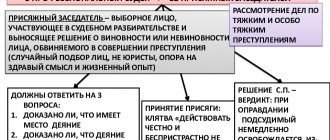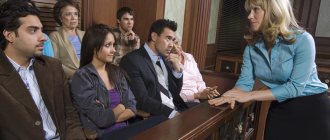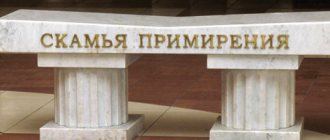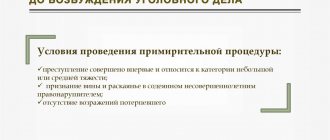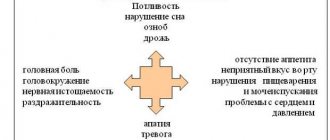In Russia, every year 300-400 criminal cases are considered by juries, and approximately every fifth one ends in an acquittal. But the jury itself constantly faces serious problems. We asked practicing lawyers how jury trials work in Russia and what awaits them next.
What is a jury and what is their job?
A professional judge also participates in a jury trial. The jury makes a decision regarding the guilt of the defendant and whether the crime itself has been proven. The judge imposes punishment on the guilty person in accordance with the rules of law.
Thus, jurors must answer three key questions during the trial:
- Has the crime been proven?
- Has it been proven that it was the defendant who committed it?
- Is he guilty of the crime he committed?
If a majority of the jury answers yes to each of these questions, then the defendant is found guilty. If half of the jury answered no to at least one question, he will be acquitted.
If there is an equal number of votes for and against the defendant's guilt, he will also be acquitted.
The acquittal of the defendant by the jury is binding on the judge. Conviction - no. In this case, the judge has the right to overturn it if he believes that the defendant is innocent. The court will refer the case for consideration by another panel of the court.
Organization of trial by jury
As stated above, consideration of a criminal case by a jury is the exclusive right of the defendant accused under certain articles of the Criminal Code of the Russian Federation. That is, the court cannot impose a compulsory jury trial - its motion is required.
Submit a petition
the defendant can from the moment he familiarizes himself with the case until the appointment of a court hearing, including at the preliminary hearing (and the investigator must report this).
If more than one person is accused in a case, the jury will consider their case as one. For this purpose, a petition from one of the accused is sufficient if the others support it. If someone is against it, the judge will have to separate his case into separate proceedings (if at all possible).
An important point - jury selection
, and it begins long before the start of the trial. In general, the process consists of several stages:
- the municipal administration randomly selects a number of candidates from the State Automated System “Elections” (that is, from the general database of those who have the right to vote);
- the list is edited and corrected, then it is transferred to the regional level, where a general list is compiled for all courts of the constituent entity of the Russian Federation. This list is published in the media.
If a citizen finds himself on the list, but for some reason reason he doesn't want to serve on a jury, he submits a corresponding application and is excluded from the list.
- the list of candidates (main and reserve) is sent to the court;
- After the motion, the judge orders a jury trial and orders the selection of a certain number of jurors. This is done by the secretary or assistant referee in a random order. Usually a little more people are selected than 6 or 8 - some part will still not show up.
Selecting suitable people to sit as jurors is not very easy, says Petr Gusyatnikov from the law firm PG Partners. Thus, serious requirements are imposed on them; persons cannot serve as jurors
:
- under 25 years old;
- having an outstanding or unexpunged criminal record;
- incapacitated or having limited legal capacity;
- registered in a drug treatment or psychoneurological dispensary;
- suspected or accused of a crime;
- those who do not know the language in which the case is being conducted;
- having other disadvantages that do not allow them to participate in the process.
Accordingly, jury selection is a very troublesome business.
:
In theory, finding a sufficient number of such citizens is not difficult, but in practice they still need to be checked, asked to provide certificates of no criminal record, from the PND, ND, etc. – this also takes time and resources.
Petr Gusyatnikov, senior managing partner of the law firm PG Partners.
When the selected jurors appear in court on the appointed date, the presiding judge gives them opening statements and explains the main features of the trial. The jury is then asked if they have any reason not to participate. Here, each of the selected people can recuse themselves (that is, voluntarily refuse to participate in the process).
After this, both parties to the process can exercise their right to reasoned challenge
(usually if the prosecution or defense suspects that the juror will be biased).
As a result, there should be at least 10 candidates left when the case is considered in a city or district court and at least 12 when considered in the Supreme Court of the region. If there are more of them, the parties can exclude candidates from the list at their discretion; if there are fewer, people must be selected from the lists again.
Then the list is reduced, respectively, to 10 or 8 names, of which 8 or 6 people make up the jury
, and the remaining two become spares. They take an oath (which is why they are called jurors).
Regarding the jury trial itself, there are several features:
- jurors can ask questions of participants
in the trial. But not immediately (after the prosecution and defense) and only in writing through the presiding judge; - The jury considers only those circumstances
that directly affect the guilt or innocence of the defendant. They study information about the defendant’s personality only when it directly affects the degree of his guilt; - both the stage of judicial investigation and the stage of argument between the parties consist of two parts - with the presence of the jury and with their absence
(for example, in their presence it is impossible to talk about the verdicts for an accomplice in the crime, whose case was considered separately).
After this, a question sheet is prepared for the jury, in which the main and additional questions are formulated - in clear words and for each defendant separately. Main questions
such:
- whether it has been proven that the act took place;
- whether it has been proven that the defendant committed this act;
- whether the defendant is guilty of committing this act.
There are also private questions
– if they affect the degree of guilt of the defendant or may lead to his release from liability.
Also, if the defendant is found guilty, the question is raised whether he deserves leniency.
(which may also affect the judge’s final verdict).
The presiding judge gives parting words
– in it he briefly talks about the case under consideration, the positions of the prosecution and defense, explains the article of the Criminal Code of the Russian Federation under which the defendant is accused, and explains the voting procedure.
After this, the jury is sent to a deliberation room, where no one else is allowed to be present. They can leave it if they have reached a verdict or if night has fallen (with the permission of the presiding judge).
A foreman is selected from the jury
, who counts the votes and signs the question sheet with the answers.
The jurors must strive to reach a unanimous decision, but if after 3 hours of deliberation they cannot reach a unanimous decision, a vote is taken:
- a guilty verdict is pronounced if more than half of the jury answered in the affirmative for all 3 main questions;
- If at least half of the jury answered negatively to at least one of the questions asked, a verdict of not guilty
.
For other questions, the answers are determined by a majority of votes (and if the votes are equally divided, then in favor of the defendant). Interestingly, even if a guilty verdict is reached, the jury can change the charge in a more favorable direction for the defendant.
When the verdict has been returned and the answer sheet has been signed, the jury returns to the courtroom and, after checking by the presiding officer, the verdict is read out.
.
If the verdict is not guilty, then only the issues of legal costs, civil action (if there was one) and material evidence are considered further.
If the verdict was guilty, then the trial continues - the judge finds out all the other circumstances on the basis of which he will render a verdict (which may be acquittal).
For participation in the consideration of the case, each juror receives certain material benefits:
- remuneration in the amount of half the judge’s salary for all days of participation in meetings - but not less than the salary received by the jury;
- compensation for travel and transportation expenses (for travel to the location of the court and back);
- all guarantees and compensation at the place of work are preserved;
- Time spent participating in meetings is considered work experience.
In fact, there may be problems with payments: you will have to collect salary certificates from your place of work, and in some situations, due to problems with documents from one juror, the entire panel does not receive money.
In any case, agreeing to participate in court just for the sake of money is not worth it - rather, it is a socially useful activity
.
What types of cases do juries hear?
After the expansion of the powers of jurors, their competence included cases of serious crimes. In particular:
- Murder without aggravating circumstances.
- Intentional infliction of grievous bodily harm resulting in death through negligence.
- Aggravated murder.
- Illegal production and sale of drugs.
- Drug smuggling by organized crime groups.
- Encroachment on the lives of government and public figures, law enforcement and investigative officers.
- Genocide.
Thus, a jury can try almost all major crimes, with the exception of those committed by persons under the age of 18.
Jury trials in Russia: past, present and future
A little history
The jury trial in Russia appeared as a result of the judicial reform of 1864. “The idea was that questions of fact, that is, whether this or that event happened or not, would be decided by the jury, and questions of law, that is, the qualifications of the act, would be decided by the judge,” says Roman Nefedov from the Law Bureau “Q&A” Law Bureau “ Q&A" Regional rating. group Family and inheritance law group Criminal law group Arbitration proceedings (major disputes - high market) Company profile. This approach eliminated the bias of the judge, who was now bound by the jury's verdict.
With the advent of Soviet power, this model of justice was abolished. The reasons for this were political, Nefedov is sure. The transition to a new system, which also took place by force, required controlled legal proceedings.
6 and 8
– this is how many jurors are needed to try a case in the district and regional courts, respectively.
Formally, they returned to jury trials at the end of the USSR. In 1989, the Supreme Council reserved the right to such a trial for defendants facing the death penalty or imprisonment for a term exceeding ten years. But in reality, the jury resumed its work later - after the collapse of the USSR. In 1993, as an experiment, it appeared in five regions: Ivanovo, Moscow, Ryazan, Saratov regions and Stavropol Territory. And already in 2004, juries began working in all regions, with the exception of Chechnya - there this happened only in 2010.
Initially, the panels met only in regional courts and consisted of 12 people. But in June 2022, amendments came into force that reduced the number of jurors in regional courts to eight people, and also extended this institution to district courts. The latter were given the right to consider cases with the participation of only six assessors.
How does the “people’s” court work now?
At the moment, the jury has jurisdiction over several dozen crimes listed in paragraphs 2 and 2.1 of Part 2 of Art. 30 Code of Criminal Procedure. In practice, most often, representatives of the people have to deal with murders, as well as infliction of grievous bodily harm resulting in death through negligence, says senior partner of the Law Office ZKS Law Office ZKS Federal Rating. Criminal Law group 16th place by revenue per lawyer (less than 30 lawyers) 41st place by revenue Company profile Andrey Grivtsov.
When rendering a verdict, assessors must strive for unanimity, but if it cannot be achieved within three hours, then the decision is made by a simple majority of votes, says Art. 343 Code of Criminal Procedure. If the votes are divided equally, then the acquittal verdict wins. It is binding on the judge, who, after its announcement, must pronounce an acquittal. But a guilty verdict does not prevent the judge from acquitting the defendant, it follows from Art. 348 Code of Criminal Procedure.
To the question of whether a jury trial is needed in modern Russia, all the experts interviewed without a doubt answer in the affirmative.
If you want real competition, equality of arms, the presumption of innocence, the right to a defense and the influence of the defense in court, then you need a jury.
Sergey Pashin, retired federal judge, professor at the Faculty of Law of the National Research University Higher School of Economics
Nefedov agrees with him: “It happens that a judge, seeing that the evidence of guilt is frankly weak, instead of acquitting a person, will impose a minimum punishment, change the classification of the act, or, in the worst case, return the criminal case for additional investigation.”
The jury judges based on its assessment of the evidence. They do not forgive mistakes in the preliminary investigation and poor preparation of state prosecutors, notes senior partner AB Koblev and partners Koblev and partners Federal Rating. group Criminal law Company profile Ruslan Zakalyuzhny. It is for this reason that the number of acquittals with a jury is disproportionately higher than without it.
After the already mentioned reform, which allowed juries into district courts, and also expanded the list of crimes under their jurisdiction, the number of trials with the participation of assessors doubled. But despite the positive dynamics, the total number of such proceedings is still negligible.
Why are juries rare in Russia?
There are several reasons why jury trials are so poorly spread in Russia. One of them is the disinterest of government officials in this model of justice, the interviewed lawyers agree. “The investigative authorities and the prosecutor’s office do not want to lose the virtually guaranteed conviction of a person. And judges should delegate to representatives of the people what they consider “their” business,” argues Pashin.
According to him, investigative bodies can influence the demand for jury trials by changing their composition. For example, murder is reclassified as causing death by negligence, which is beyond the jurisdiction of the assessors. Sometimes law enforcement officers also resort to persuasion, says Pashin. They inspire the accused: if the jury convicts, there will be a very severe punishment, and if they are acquitted, the verdict will still be overturned. This, according to the retired judge, greatly disorients the defendants. Of the 1,044 people who requested a jury trial, 115 (11%) withdrew their requests, according to the Judicial Department.
62,1%
jury acquittals overturned on appeal in 2022.
At the same time, the threat of the acquittal being overturned, which investigators periodically refer to, is more than real. And this is another problem that hinders the active spread of jury trials. Last year, appeals overturned 62.1% of jury acquittals, according to the Institute of Law Enforcement Problems at the European University in St. Petersburg. For comparison, in the United States, a jury’s acquittal cannot be overturned at all, says the expert.
Another confirmation that the “people’s” court hardly enjoys the support of the authorities is the small number of crimes that are subject to the jurisdiction of assessors. At first, there were about 50 such cases. Later, their number was reduced by almost half, excluding from the list, in particular, cases of espionage, riots, sexual crimes, criminal communities, and bribes. Then several crimes were added - today there are about 30 of them. This is not enough, Pashin believes. He recalls that in the Russian Empire, juries could consider more than 400 compositions. And in modern America they have jurisdiction over any crimes and even some civil cases.
The potential jurors themselves are not particularly interested in a jury trial.
The court calls 300 candidates, but only 20 show up. As a rule, jurors are dismissed from the panel without explanation and without any motives.
Viktor Momotov, Chairman of the Council of Judges (quote from a meeting of the Zamyatnin Club)
A study by the Public Chamber showed slightly more optimistic statistics. According to him, only a quarter of those surveyed said that they would refuse to serve as a jury, and the same number found it difficult to answer.
“Not everyone is ready to take a long break from work and everyday affairs in order to work as an assessor,” comments Vasily Tregubov from the EMPP EMPP Federal Rating on the problem of non-appearance. group Arbitration proceedings (medium and small disputes - mid market) group Family and inheritance law group Environmental law group TMT (telecommunications, media and technology) group Corporate law/Mergers and acquisitions (high market) group Criminal law 15th place In terms of revenue per lawyer (less 30 lawyers) 33rd place by revenue. “If it was guaranteed that the process would last a week or a week and a half, then people would come,” Pashin agrees with him, adding that now some proceedings last for three years. “Who would do this?” he wonders. Another reason for the low turnout is lack of trust in the judicial system. People do not believe that they can administer justice themselves, explains Nefedov. The absence of a strict obligation to participate and responsibility for evading this also affects, Zakalyuzhny adds. One way or another, it is quite difficult to assemble a panel, which significantly delays the process and ultimately affects the attractiveness of the “people’s” court.
What's next?
The lawyers surveyed unanimously state that jury trials need to be developed. And here, in their opinion, two main directions should be highlighted. This is an increase in the turnout of juror candidates and an expansion of the list of crimes that jurors can try.
There are several ways to increase turnout, says MCA lawyer Knyazev and partners Knyazev and partners Federal Rating. group Criminal law Company profile Alexey Serdyuk. On the one hand, it is necessary to establish responsibility for those who decide to ignore the subpoena. On the other hand, to increase material guarantees for jurors, which, by the way, the Ministry of Justice is now trying to do. In parallel with this, it is necessary to actively increase the level of legal culture of the population. Without this, the institution of juries will not develop, Serdyuk is sure.
Zamyatnin Club: Supreme Court judges and lawyers discussed how to change the jury
Another way to combat non-appearance is to shorten the time frame for jury trials. “We need to make sure that citizens do not spend two or three months in court, but spend a week or at most a month,” Momotov said at a meeting of the Zamyatnin Club, adding that the judicial system has such capabilities.
In turn, there has been talk about increasing the number of jury trials for several years now. At the beginning of 2020, President Vladimir Putin instructed the Supreme Court, by June 1, 2020, to “consider issues of expanding the offenses that can be considered by jury courts.” And already in February, the head of the Supreme Court, Vyacheslav Lebedev, proposed extending the jurisdiction of jury trials to all particularly serious cases and cases of crimes in the field of business.
Titov proposed transferring the cases of entrepreneurs to a jury trial
A month later, business ombudsman Boris Titov sent Lebedev a bill that provides for the transfer to assessors of cases of fraud, embezzlement, abuse of power in relation to individual entrepreneurs, founders and participants of companies, as well as top managers and chief accountants. In October it was reported that the head of the Supreme Council supported Titov’s idea, but the bill never reached the State Duma.
In August of this year, it became clear that a jury may be allowed to consider criminal cases of an economic nature in the IT sector. This follows from the “road map” to create additional conditions for the development of the industry, which was approved by the government commission on digital development on July 20. According to the authors of the document, the measure will increase the satisfaction of market participants with the conditions for doing business in Russia and will reduce the outflow of developers from the country.
The majority of experts surveyed speak about the need to extend jury trials to “entrepreneurial” panels. According to Serdyuk, first of all, Part 4 of Art. 159 (“Especially large fraud”), part 4 of Art. 160 (“Especially large embezzlement”), part 2 of Art. 199 (“Especially large-scale tax evasion”) and part 2 of Art. 201 of the Criminal Code (“Abuse of power with grave consequences”). Moreover, this should be done without any reservations, the lawyer emphasizes. In some cases, it is possible to provide additional requirements for jurors, says Anton Gusev of Bryan Cave Leighton Paisner (Russia) LLP Bryan Cave Leighton Paisner (Russia) LLP Federal rating. group Antimonopoly law (including disputes) group Arbitration proceedings (medium and small disputes - mid market) group Foreign trade activities/Customs law and currency regulation group PPP/Infrastructure projects group Land law/Commercial real estate/Construction group Intellectual property (Protection of rights and litigation) group Intellectual property (Consulting) group International arbitration group Tax consulting and disputes (Tax disputes) TMT group (telecommunications, media and technology) group Transport law group Labor and migration law (including disputes) group Digital economy group Bankruptcy (including disputes) (high market) group Compliance group Corporate law/Mergers and acquisitions (high market) group International litigation group Tax consulting and disputes (Tax consulting) group Natural resources/Energy group Family and inheritance law group Criminal law group Pharmaceuticals and healthcare group Financial/Banking law group Private capital 2nd place By revenue 2nd place By revenue per lawyer (more than 30 lawyers) 5th place By number of lawyers Case profiles can only be considered by citizens with higher education or business experience.”
At the same time, “economic” crimes should be only the first stage in expanding the institution of juries, Pashin is sure. In general, in his opinion, almost all compositions can be “given” to assessors. “In any case, every time a citizen faces imprisonment, he should have a choice: to use the state justice system or a jury trial,” the retired judge is convinced.
- Kira Klimacheva
Who can serve as a juror?
Any citizen who meets the following requirements can be a juror in Russia:
- He turned 25 years old.
- He was not convicted.
- Not registered in psychoneurological and narcological dispensaries.
- Is legally competent.
The restrictions also prohibit the appointment of jurors:
- Priests.
- Civil servants.
- Military.
- Law enforcement officials and the judicial system.
One citizen may be selected as a juror no more than once a year.
Material support for jurors
During the performance of his duties in the administration of justice, the relevant court pays a juror, at the expense of the federal budget, a compensation in the amount of half the official salary of a judge of this court in proportion to the number of days of participation of the juror in the administration of justice, but not less than the average earnings of the juror at the place of his main work for such a period.
The juror is reimbursed for travel and transportation expenses in the amount established for judges of this court.
The time a juror performs his duties in the administration of justice is counted towards his length of service.
How are jurors selected?
To select jurors, the State Automated System “Elections” database is used. Based on it, a computer program selects citizens randomly. After checking the selected results against the criteria described above, the list is approved and published in local media.
From this list, members of the jury are also randomly selected before considering a particular case. Citizens themselves are notified of their choice at least a week before the preliminary court hearing.
During this meeting, the final jury selection takes place. The judge, the defendant and the prosecutor are present with him. Each of them has the right to reject candidates. Two jurors can be rejected without explanation, the rest only if there is good cause.
The formation of the jury panel is completed by the selection of its chairman. The jury does this themselves. After the choice, they all take an oath. The fact of the oath obliges the assessor to appear in court. Administrative liability is provided for failure to appear.
Selection of juror candidates in Russia
There is a clearly regulated procedure for selecting jurors.
First of all, these are the requirements for jurors; below we will dwell on this in more detail.
The panel of jurors is formed at a separate stage of the legal proceedings, candidates are selected from those people who were called for selection to the court.
People are called from a special list that has been valid for 4 years and prepared by the executive body of state power of the subject. This list is prepared on the basis of current information about the population in the region (krai), through random sampling.
Information about the number of people is taken from the same sources that are used before the elections (State Automated System “Elections”).
The generated lists are sent to the court, where the selection of jurors who will directly participate in the consideration of the case takes place. The selection is carried out according to the criteria provided for by Federal Law No. 113-FZ.
How long does the trial last?
The law provides for the involvement of citizens as jurors for 10 days. But if the trial of the case requires more time, then their term of service as a jury is extended. In special cases, cases can drag on for several months.
Have a question for a lawyer? Ask now, call and get a free consultation from leading lawyers in your city. We will answer your questions quickly and try to help with your specific case.
Telephone in Moscow and the Moscow region: +7
Phone in St. Petersburg and Leningrad region: +7
Free hotline throughout Russia: 8 (800) 301-39-20
Formation of the jury
Determining the circle of persons suitable for the role of assessors is an important aspect in the work of this institution. Not every citizen can be selected for this role; there are a number of requirements that serve as selection criteria. These include age (from 25 years), citizenship, lack of criminal record and legal capacity.
The jury in Russia is formed on the same principle as the voter lists. There is a random sampling program that, in accordance with specified criteria, determines the circle of people suitable for the role of assessors. All this is systematized. The only thing that the participants in the proceedings, namely the prosecution and defense, do is ultimately determine the final composition of the jury together with the presiding judge.
As already noted, there are requirements that do not allow anyone to become a member of the board. It is especially important that persons working in the legal profession, as well as prosecutors, clergy and military personnel are not suitable for the role of jury. There are no restrictions for representatives of other fields of activity.
If a person works, how can he leave work for so long?
The law requires an employer to release an employee selected for jury duty. Moreover, he does not have the right to deprive this employee of benefits or transfer him to another position, much less fire him.
If there is no one to replace the employee, his manager has the right to file a petition to relieve the employee from serving as a jury. But the satisfaction of this request is the prerogative of the court.
Peculiarities of consideration of a case by a jury
A trial with the participation of jurors is practically no different from what happens without them. However, a number of changes are still present, which is reflected in the stages of consideration of the case. The modern jury trial in Russia gives assessors the right to completely decide the fate of the defendant. The activities of the board are allocated to several separate stages of the trial, which emphasizes their importance.
The jury draws up a question sheet, that is, they themselves decide what answers they want to receive during the consideration of the case. Any influence on them is unacceptable. In order to prevent bias in such a process, the process of examining evidence is changed and the background of the accused is not discussed. All this is aimed at achieving the most objective and fair result possible.
What if a person does not want to serve on a jury?
The law allows jurors to recuse themselves with reason. However, it must be justified. Most often, citizens refer to the impossibility of replacing them at their place of work. For example, this method of obtaining a challenge is used by emergency doctors, pilots or teachers.
Another common argument concerns doubts about one's own objectivity when considering a given case. At the same time, it is important to explain what caused the subjective approach to this matter.
Many people simply ignore summonses to appear for jury duty. There is no liability for this. But if a citizen has already attended a preliminary court hearing and sworn in as a assessor, then in the future he will be held administratively liable for failure to appear.
Who cannot be a juror in Russia
The list of persons whose participation in a criminal case as a juror is excluded is given in Article 3 of the Law of the Russian Federation “On jurors of federal courts of general jurisdiction in the Russian Federation”, these include:
- Persons who, at the time of compiling the relevant lists of candidates, have not reached 25 years of age
- Persons whose criminal record has not been expunged or expunged
- Incapacitated or partially capable persons (this is confirmed by a court decision that has entered into legal force)
- Persons suffering from alcoholism, drug addiction, substance abuse, chronic mental disorders and, in this regard, registered with a narcologist or psychiatrist (PND, ND).
- Persons suspected or accused of committing crimes
- Persons who do not speak the language in which legal proceedings are conducted (for the Constitutional Court of the Russian Federation, the Supreme Court of the Russian Federation, cassation, appeal, arbitration and military courts this is Russian; for other courts of general jurisdiction - Russian or the state language of the corresponding republic)
- Persons who, due to mental or physical disabilities, are deprived of the opportunity to take full part in the judicial process
The specified list is closed and cannot be expanded arbitrarily, i.e. in the absence of the above circumstances, any citizen may be included in the preliminary list of juror candidates.
If any of the above circumstances becomes clear after a citizen has been included in the preliminary lists of juror candidates, then after such circumstances are clarified, he is subject to mandatory exclusion from such lists.
Juror immunity
According to Federal Law No. 113 “On jurors,” they are subject to guarantees of the independence and immunity of judges established by the Constitution of the Russian Federation.
This is stated in Article 12 of this law, which also specifies that for preventing a juror from performing his duties, liability is provided for by law.
Who may be excluded from the list of juror candidates?
After the lists of candidates, including reserve ones, have been formed, exclusion from them is made based on written statements of candidates for jurors, in the following cases:
1.It was revealed that the citizen does not meet the requirements established by law for a juror, that is, those requirements listed in Article 3 of the Federal Law “On jurors in federal courts of general jurisdiction of the Russian Federation” (this is the basis for the mandatory exclusion of a candidate from the lists)
2.The candidate for juror reported in writing the reasons why he cannot serve as a juror, namely:
- does not speak the language of the proceedings in which the process is conducted
- is unable to perform the relevant duties due to health reasons (this must be documented)
- reached the age of 65 years
- holds a public or elected position in local government
- is a military serviceman
- Five years have not passed since the date of his dismissal from military service under a contract from the FSB, state security or foreign intelligence agencies
- is a judge, prosecutor, lawyer, investigator, investigator, notary, private detective, bailiff, or ceased to hold the corresponding position less than five years ago
- is an employee of the Department of Internal Affairs, the Federal Penitentiary Service, customs authorities with a special rank, or was dismissed from the relevant service less than five years ago
- is a clergyman
Also, a candidate for jury may be excused from participating in the case if he declares that he has other valid reasons, which include the following:
- the candidate for juror is over 60 years old
- female juror candidate has children under 3 years of age
- a candidate for juror, due to his religious beliefs, does not consider it possible for himself to participate in the administration of justice
- the position (profession) held by a candidate for jury does not allow him to be distracted from his professional and official duties without significant damage to public and state interests (doctors, airline pilots, teachers, etc.)
This list of reasons is not final, which means that each candidate for jury can declare other, purely individual reasons that do not allow him to participate in the criminal process.
So, if there are good reasons, the candidate for jury will be excluded from the preliminary lists and released from further participation in the selection, having previously explained to him that, if he wishes, he can still take part in the process.
Advantages of a jury trial
The benefits of such a court composition are directly related to what the jury does. The main advantages of their participation in court are as follows:
- A sentence may be legal in form, but unfair in essence. A judge has no right to acquit a person if he is convinced of his innocence, but the evidence suggests otherwise. Jurors can do this.
- The jury's opinion indicates public perception of a particular legal norm. That is, if, contrary to the requirements of the law, the jury acquits the defendants under this article, legislators should think about its compliance with social realities.
- Some laws can be interpreted in two ways. In such a situation, the decision of the jury often turns out to be more objective than strict adherence to the legal norm on the part of the judge.
- The mercy shown by juries increases confidence in the judicial system.
According to statistics, in cases in which jurors are involved, there are significantly more acquittals than in courts where a single judge makes a verdict.
A little history
Such an institution as a jury appeared in Russia at the end of the nineteenth century, when serious changes took place in the system of society. The development of bourgeois relations entailed a lot of changes, which did not bypass the houses of justice. However, the essence of such an institution was most clearly reflected only in the early nineties of the twentieth century.
The judicial system of the Russian Federation has undergone great changes and is very different from what could be observed in the empire. The difference was manifested in the meaning of this institution: in modern Russia it is a reflection of democracy, the word of the people has special weight, and in past centuries it was one of the forms of administering justice without any independence.
In general, the history of jury trials developed very slowly and not always positively. However, the main points, namely the number of assessors, oral and publicity, composition - all this has similarities both in past centuries and at the present time, which allows us to speak about the long and dynamic development of this institution.
Disadvantages of a jury trial
Along with the advantages of a jury trial, it also has a number of disadvantages:
- Citizens brought in as lay judges, as a rule, do not have legal knowledge. Therefore, to eliminate possible problems, a professional judge is involved in the case.
- There are objections that a jury trial is quite expensive for the budget. However, it must be taken into account that if an innocent person is acquitted, the latter will not have to be kept in prison also for budget money.
- The prosecutor and defense attorney can significantly influence the jury by using their oratorical abilities.
- Considering that different people have different abilities to persuade and impose their opinions, when discussing a decision in the deliberation room, it can be made not so much by a majority vote, but under the pressure of the speeches of the loudest and most assertive members of the jury.
In general, given the fairly long history of jury trials in many countries, it has proven to be an effective means of achieving objectivity and eliminating some of the shortcomings of the judicial system.
How do jury trials usually end?
As mentioned above, when cases are considered by juries, the proportion of acquittal verdicts is much higher
than in a single review by professional judges.
The reasons for this may be different - at a minimum, the procedure for reaching a verdict by the jury is inclined more in favor of the accused. Also, as Nikolai Gerasimov says, jurors can take into account what professional judges do not take into account:
As follows from the statistics of the Judicial Department at the Supreme Court of the Russian Federation, throughout the entire period the number of acquittals passed by a jury trial was many times greater than the number of similar sentences passed by professional judges. As an average, I think we can give approximately the following ratio: 20% / 0.2%. This indicator, in my subjective opinion, is caused by several main reasons:
- The ability of a jury to evaluate this or that act, as well as the guilt of a certain person in committing it, from the point of view of an ordinary person and acceptable standards of morality and ethics, as well as rules of behavior in modern society, which, it seems to me, due to some professional deformation and judges are deprived of the rules of the existing state system.
- In my opinion, as I have already mentioned, the quality of the preliminary investigation, the formation of the evidence base and the state prosecution in court in the Russian law enforcement system leaves much to be desired. When considering criminal cases by a single judge, in my opinion, the court can “turn a blind eye” to many violations and inconsistencies in the prosecution’s version, which a jury will not do.
- In a court with the participation of jurors, in my opinion, there is a much greater opportunity to implement the principle of adversarialism and equality of the parties, the absence of which, as it seems to me, often suffers from judicial proceedings when a case is considered by professional judges.
Nikolay Gerasimov, lawyer in criminal and civil cases in the field of business activities.
By the way, there is another interesting feature that is revealed by the statistics of the Judicial Department. As can be seen from the jury trial procedure, the verdict itself is made by a professional judge
, who is obliged to take into account the opinion of the jury.
And if everything is clear with acquittal verdicts, then when juries pronounce guilty verdicts, judges are inclined to more serious punishments. Thus, the statistics of cases under Part 1 of Article 105 (unqualified murder) are as follows:
- when considered by judges alone, every second defendant received a sentence of 8 years of imprisonment or less;
- when considered by the jury - of the 31 defendants found guilty, only 6 received sentences of 8 years or less (despite the fact that the jury found every third defendant deserving of leniency).
In other words, if you ask for a jury trial, the chances of being acquitted will be many times higher than if it were considered by a single judge - but if you get a guilty verdict, the punishment will be more severe
.
It is still difficult to say what causes such statistics. Perhaps judges are more confident in the guilt of defendants if the jury shares this position.
As for the higher percentage of acquittals, there is one more feature among them - in almost every second of them the jury reached a unanimous verdict
. This speaks not only of the good work of the defense, but also of the weak work of the investigators.
The jury’s decisions may also be influenced by the fact that they take this responsibility very seriously and are afraid of making a mistake, says Nikita Filippov:
Such a high percentage of acquittals is not a consequence of the jury’s incompetence in matters of criminal law; it is due to the specifics of the jury’s assessment of evidence. For a juror, the administration of justice is not an ordinary job; when making a decision about a person’s fate, a juror is afraid of making a mistake, carefully checks all the evidence in the case and is guided not by the rules of law, but by his own internal ideas about morality and morality, therefore even the slightest doubt about the guilt of the accused is sufficient grounds for a juror to return a verdict of not guilty.
Thus, the development of the institution of jury trials will inevitably entail an increase in the quality of the standard of evidence in criminal cases and the development of the Russian criminal justice system as a whole. Jury verdicts and statistics on the results of this form of court enable the judicial system to take into account the opinion of the people's legal consciousness and take into account society's demands for the fairness and legality of judicial decisions.
Nikita Filippov, head of the MGCA “Bureau of Lawyers “De Jure””, honorary lawyer of Russia.
Sergei Nosov from the Trade Union Center takes approximately the same position
– he believes that it is possible to achieve a more or less sufficient level of justice precisely thanks to the participation of jurors, who will level out the problematic work of the prosecutor’s office:
The problem with the judicial system is its dependence on other branches of government (which itself violates the basic principles of the constitution). If we look specifically at jury trials, it is worth noting that the law enforcement system does not benefit from their presence, since there is a high percentage of acquittals.
And the magnitude of this percentage is quite understandable - during the preliminary investigation, the material of the criminal case was not collected in a qualified manner, the evidence base proving the guilt of the accused was not collected, the representative of the prosecutor who signed the indictment also does not particularly delve into the materials of the criminal case because he knows that in the course of of a judicial investigation without a jury, the judge will still take a pronounced accusatory position!
All this allows you not to worry about the fact that someone may receive a penalty or lose their position. In jury trials, such a mechanism does not work, because there is always a human factor, and given the fact that in general state prosecutors do not have the skill of communicating with jurors, they cannot correctly convey evidence of guilt to them, and people are not blind and they are not deaf and understand perfectly well that some of the conclusions of the investigation are based on conjectures and assumptions, which contradicts the Code of Criminal Procedure of the Russian Federation.
Sergey Nosov, head of partner relations at Profsoyuzny Tsentr LLC.
Practicing lawyers speak out even more categorically about the shortcomings of the Russian judicial system (which is understandable, since with their help it is much easier to achieve an acquittal for the client). Thus, lawyer and Honored Lawyer of the Russian Federation Vladimir Gorelik
believes that more active participation of jurors in court proceedings could level out many of the accumulated problems of the judicial system:
The transformation of Russian criminal justice is expressed in a direct departure from the comprehensive and generally accepted constitutional principle of the presumption of innocence towards the slogan about the inevitability of criminal liability of a person who finds himself in the position of a defendant. This departure is a natural consequence of the principles imposed from above (for reasons requiring special analysis) in the leadership of the judiciary.
In order to draw this conclusion, it is enough to analyze the proportion of acquittals, the level of which has decreased to a statistical error. And this is despite the low quality of the investigation and significant shortcomings in the work of law enforcement agencies carrying out criminal prosecution, which any practicing lawyers and representatives of law enforcement agencies and the court themselves are well aware of.
The number of acquittals is only a few, despite the impressive statistical indicators characterizing the general results of law enforcement judicial practice. And some judges cannot at all boast of having experience in such acquittal work.
Why is this happening? The personal well-being of professional judges depends on many factors, among which, as practice shows, the professionalism and objectivity of a judge are not in the first place.
Vladimir Gorelik, lawyer, Honored Lawyer of the Russian Federation.
True, there is another point of view on this problem. For example, Pyotr Gusyatnikov believes that jurors are not always competent
: “These are people who do not have a legal education, and do not always understand what exactly is being discussed at one time or another. This is why the percentage of acquittals in jury trials is higher.”
In addition, he recalls that not a very large percentage of cases go to trial by jury - since most of them are considered in a simplified manner
, when the defendant admits his guilt and the judge’s job is to give him an adequate punishment.
Rules of Jury Conduct
The jury has the right:
- take part in establishing all the circumstances of the case, ask questions to persons summoned for questioning through the presiding judge, and also participate in the examination of the provided material evidence and investigative actions;
- take personal notes and use them when preparing answers;
- ask the chairman for clarification of the law, as well as other concepts and issues that are unclear to the jury.
The jury may not:
- communicate with persons who are not members of the court on topics related to the consideration of a particular case;
- independently collect information on the case under consideration;
- violate the secrecy of voting or meetings;
- leave the courtroom during the hearing;
- discuss the circumstances of the case, express a personal opinion about it before discussing these issues when making a verdict.
Other participants in the process
The consideration of the case with the participation of jurors occurs with the mandatory participation of:
- state prosecutor (prosecutor) supporting the prosecution in court on behalf of the state;
- a lawyer (defender) who protects the rights and freedoms of the defendant;
- victim (victim of a crime);
- defendant (accused of committing a crime).
Changes in the legislative framework
Adjustments and additions were regularly made to the regulatory framework. In the period from 1878 to 1889, over 10 laws were adopted that radically changed the work of the jury in several directions. Firstly, this is its competence, secondly, the composition depending on the social status, and thirdly, the procedure and course of the proceedings. About 76% of all criminal cases in that period fell on the share of popular justice.
Society gradually realized the importance and value of trial by jury. The Provisional Government also recognized that this was the optimal and effective form of justice.
From 1890 to 1914, several more laws were passed regarding assessors. This was provoked by changes made to zemstvo legislation, as well as a significant increase in population in Moscow and St. Petersburg. At this time the procedure for taking the oath has been simplified , as well as the process of explaining rights and responsibilities. Visiting jurors were assigned travel and daily allowances from the treasury.
The changes also affected property qualifications. For landowners, it was reduced from 100 to 20 dessiatines, and for those who received a salary, it was increased from 200 to 400. Each party was given the right to summon a jury - no more than 3 people.
By 1890, the role of popular justice was significantly reduced, and increased again with the advent of the Provisional Government. In the USSR, jurors were not in great demand; they were viewed as some kind of alien socio-political phenomenon. The government insisted that 50% be selected from officers and the remaining 50% from sailors and soldiers.
The activities of modern people's courts are based on the Russian Constitution, as well as on the provisions of the Criminal Procedure Code. For all acts of which the defendant is accused, the jury may consider the following issues:
- is there evidence that a crime has occurred;
- whether it has been proven that the defendant is involved in the act;
- whether there is a fact of guilt.
Assessors have the right to examine all materials related to the case and participate in inspections of the collected material evidence. They take their own notes during the procedure and use notes in a designated meeting room.
How does the status of arbitration assessors differ from jurors?
In the arbitration process, assessors can also be involved in the consideration of the case, but only arbitration judges. This is done in cases where special knowledge is needed to understand the essence of the dispute. Thus, arbitration assessors are specialists who help judges understand the conflict.
Their difference from jurors is their powers. Arbitration assessors enjoy the same procedural rights as judges. At the same time, the competencies of jurors and judges in criminal proceedings are strictly separated.
In some cases, the defendant may exercise his right to have a jury . The list of crimes for which such consideration is possible is enshrined in the Code of Criminal Procedure of the Russian Federation. During the trial, jurors listen to representatives of the defense and prosecution and become familiar with the evidence in the case. It is the jurors who must pronounce a verdict on the defendant, and if he turns out to be guilty, then the judge prescribes a specific type of punishment.
The first stages of emergence and formation
Briefly characterizing the jury, it can be noted that this is a special legal institution that considers cases and makes decisions without the participation of experienced lawyers. For the first time, people started talking about its emergence and development in England during the Middle Ages. However, the authorities constantly tried to introduce certain restrictions to interfere with the activities of the court. The year of the creation of the jury trial is considered to be 1864.
Final institutionalization took place towards the end of the 19th century, defendants were given the right to have a lawyer, and the accused were prohibited from mistreating. According to the English principle, in the same century, trial by jury appeared in Tsarist Russia, and before that in a number of other countries: Germany and France, Italy and Austria-Hungary, Norway and Spain.
The introduction of a fundamentally new system for passing verdicts on defendants in criminal cases was associated with a major reform. It was carried out in 1864 by Alexander II. According to his decree, the jury had jurisdiction over many more issues than in other countries - almost 3 times. Since its inception and throughout its existence, this social phenomenon has shown itself to be an integral part of political democracy, the basis of the judiciary, as well as a way of expressing the constitutional rights of citizens.
During the period of reforms, criminal proceedings were structured in such a way that the assessment of the evidence base was trusted not only by officials, authorized persons, but also by people's representatives. In the pre-revolutionary period, until 1917, the jury developed as an important historical unit, confirming the evolution from the feudal system to the modern bourgeois system of law.
The jury was given certain rights:
- conduct an examination of the collected evidence along with the judges;
- disclose protocols drawn up during searches and inspections;
- ask for the appointment of an examination and talk with experts;
- require the chairman to clarify any documents.
A huge role was assigned to justice , which replaced the landlord court, which was common during the serfdom period.
New rules are being introduced in Russian judicial institutions. All counties with their associated cities constituted a world district, divided into sections. In each of them an honorary and magistrate judge was appointed. The age of the jury was limited; persons from 25 to 70 years old were allowed to participate.
